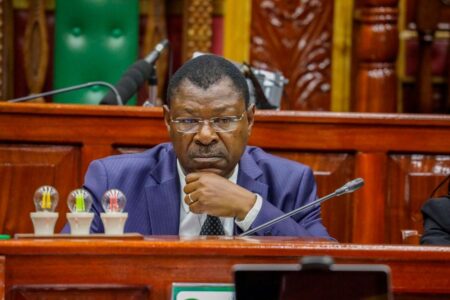The National Assembly will not be summoned for a special session to consider President William Ruto’s reservations on the now-abandoned controversial Finance Bill, 2024 that sparked mass protests and breaches of Parliament Buildings on Tuesday.
National Assembly Speaker Moses Wetangula, who received President Ruto’s memorandum of reservation over his refusal to assent to the Finance Bill on Wednesday evening, is set to notify each of the 349 MPs of the implications of the president’s action.
The Rules of the House of Representatives require that if a message is received from the Speaker, at a time when Parliament is not in session, the Speaker must immediately order that the message be transmitted to each Member and must communicate the message to the House on the next sitting.
This means that the soonest the National Assembly will consider the President’s memorandum asking MPs to delete the entire provisions of the 2024 Finance Bill is July 22 after the House of Representatives took recess on Thursday.
“Upon reading a message from the President, the message shall be deemed before the House and the Speaker may either order the message to be addressed immediately, set a day for consideration of the message, or refer the message to the relevant House Committee for consideration,” Standing Order 42 states. 3).
Lawmakers took a month-long break on Thursday morning after MPs approved a motion to deploy the Kenya Defense Forces to help police quell unrest after youth-led protests saw Parliament invaded.
Dr. Ruto on Wednesday acknowledged pressure from young protesters and concerns of Kenyans and asked the National Assembly to withdraw the bill entirely.
The bill would have automatically become law within 14 days if the president had not returned it to the House of Representatives with a memorandum recommending its deletion.
The recommendation to delete all provisions means that the bill is technically dead.
The President’s letter, which Mr Wetangula received on Wednesday evening, has been submitted to the Finance and National Planning Committee for consideration.
The committee, chaired by MP Mulu Kuria Kimani, is expected to consider the President’s memorandum and submit a report when the House of Representatives reconvenes on July 22, 2024.
Representatives will be asked to vote on the President’s recommendation to delete the draft law completely by voting on it item by item.
It would require an MP seeking to retain a provision in the bill or repeal the President’s Memorandum to muster 233 MPs or a two-thirds majority.
Once all provisions of the bill are deleted, they cannot be reintroduced until six months later.
The bill is scheduled to become law by June 30, and will go into effect on July 1, 2024 and continue until June 30, 2025.
“I decline to assent to the Finance Bill 2024 and refer the Bill for reconsideration by the National Assembly with a recommendation that all its provisions be deleted,” Dr Ruto said in a memorandum notifying Parliament of his reservations on the Revenue Increase Bill.
The government was counting on the passage of the bill to raise Sh347 billion in the 2024/25 financial year to plug Dr Ruto’s Sh3.92 trillion budget deficit.
Dr Ruto came down last week and accepted the National Finance and Planning proposals submitted by the National Assembly to abolish the imposition of value added tax on bread, the 2.5 per cent motor vehicle tax, the 25 per cent excise duty on edible oil and the controversial environmental tax. Imposing a fee on plastic packaging materials at a rate of Sh150 per kilogram.
If MPs vote to delete all provisions of the Finance Bill 2024 as proposed by Dr Ruto, the government will proceed with revenue raising measures for the 2023/24 financial year.
Young Kenyans have been taking to the streets since last week in a massive campaign urging MPs not to approve a punitive finance bill that proposes additional taxes and duties on individuals and businesses, but MPs remained adamant, passing the bill on Tuesday amid protests that broke out across the country. 35 of 47 counties.
In Nairobi, protests that witnessed continuous battles throughout the day culminated in the most rapid event in history: the breach of the Parliament buildings, just moments after lawmakers approved the controversial bill through its third reading.
